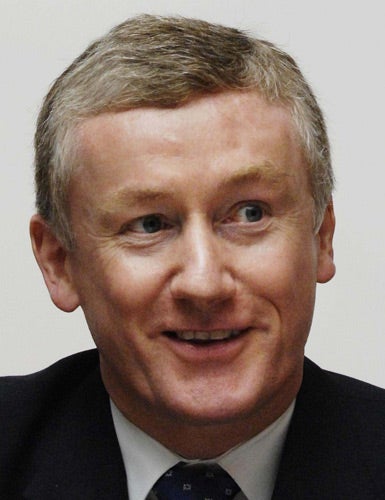Former RBS boss Sir Fred Goodwin agrees to pension cut

Former Royal Bank of Scotland boss Sir Fred Goodwin bowed to public pressure today and offered to hand back more than £210,000 a year of his controversial pension payout.
The bank's disgraced ex-chief executive "volunteered" to reduce his pension payout from £555,000 to £342,500 a year, according to RBS.
Sir Fred's pension deal sparked public outrage, leaving him with a £703,000-a-year package - including a £2.7 million lump sum - despite leading the bank to the brink of disaster.
He has previously refused to give up any of his entitlement but is thought to have been under pressure amid the threat of legal action from RBS.
However, RBS claimed he approached the bank himself after being cleared by a recent internal inquiry into his conduct and pension arrangements.
Today's concession will see the total value of his pension pot fall by £4.7 million, described by the bank as "an acceptable amount to all parties".
Chancellor Alistair Darling said: "I'm very glad that RBS have now resolved the matter with Sir Fred Goodwin.
"I think that Sir Fred, in handing back part of his pension, is doing the right thing."
Mr Darling, who was speaking during a visit to Sheffield, added: "What I want to do now is to make sure that we rebuild RBS and all its banking operations, that's absolutely essential, not just for the bank but for the thousands and thousands of people who work for that bank and for the economy as a whole."
RBS is now more than 70% owned by the taxpayer after being hammered by the financial crisis.
It reported record UK losses in 2008 and tens of thousands of staff have lost their jobs.
Sir Fred is believed to be in the south of France having gone to ground since the huge "rewards for failure" row over his pension erupted earlier this year and his house in Edinburgh has been vandalised.
The bank's chairman Sir Philip Hampton said: "On any measure this represents a very substantial reduction to Fred's pension and is an acceptable amount to all parties to the discussion.
"I am very pleased that we have resolved a situation that has been a difficult and unhappy one for all the parties involved, and it is to Fred's credit that he has done this on a voluntary basis."
He added that the row was distracting from the task of recovering the fortunes of the stricken bank.
"This pension arrangement became a symbolic issue, and the focus of unprecedented media and political attention.
"It had to be fixed to allow everyone to focus our energies where they should be, on getting the company back to health," Sir Philip said.
The chairman added that an internal inquiry into Sir Fred's pension, conduct, expenses and use of company assets had concluded recently "there was no conduct on Fred's part that would justify reducing the pension".
He said Sir Fred had wanted to wait until the conclusion of the inquiry before addressing the issue.
But trade union Unite dismissed news of the pension reduction as a "small gesture".
Rob MacGregor, Unite national officer, said: "For the diabolical failure by Fred Goodwin which led to the near collapse of RBS, this small gesture represents only a fraction of the massive pension that he is walking away with.
"Goodwin will still enjoy a very comfortable future at the expense of the taxpayer."
Sir Fred's offer marks a major climbdown after he denied as early as April that he was considering any voluntary reduction in his pension - a decision that caused outcry given the part he played in the bank's woes.
RBS was heavily exposed to toxic assets and bad debts, and disastrously bought Dutch bank ABN Amro at the top of the market in 2007 before the credit crunch struck.
Sir Fred previously maintained he had a contractual right to the pension and he expected the bank to fulfil its obligations.
In a letter to City Minister Lord Myners in February, he insisted that changes to the early retirement deal he negotiated when he was forced out in the autumn were "not warranted".
The bank and the Treasury have since been taking legal advice on whether they could claw back some of the payment.
Sir Fred agreed to give up a year's salary lump sum which he was due in lieu of notice, as well as certain share-related awards, when he agreed to retire early as the Government stepped in to rescue the beleaguered RBS.
But there was anger over news that the RBS board chose to almost double the size of his pension pot.
If he had been dismissed rather than leaving on agreed terms, his pension would have been substantially less, calculated at an estimated £416,000 a year.
UK Financial Investments, the body charged with managing Government-owned stakes in banks, said: "We agree with the Treasury's view and are glad the bank has now resolved this matter with Sir Fred.
"It was the right thing to do. It is now time to move on and concentrate on getting RBS back to strength."
Subscribe to Independent Premium to bookmark this article
Want to bookmark your favourite articles and stories to read or reference later? Start your Independent Premium subscription today.

Join our commenting forum
Join thought-provoking conversations, follow other Independent readers and see their replies